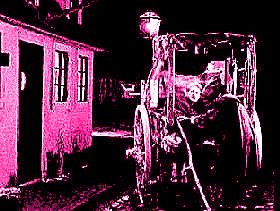Film Review
After the great Ingmar Bergman, Victor Sjöström is
unquestionably the second most important figure in Swedish
cinema.
Not only was he an accomplished actor, appearing in over
forty films, but he was also one of the world's greatest cineastes,
achieving success both in Hollywood and his native Sweden. Sadly,
much of his early work is lost, but what remains more than bears
testament to his genius for cinematic art. Of
Sjöström's Swedish films, his finest is
The Phantom Carriage, a powerful
morality tale that also serves as a haunting meditation on the
transience and profound ironies of human existence, metaphysical themes
that have a distinct Bergmanesque ring to them.
The Phantom Carriage is a rare
example of a silent film which effectively combines social realism and
expressionism, and in a way that does not appear contrived or wilfully
arty. Its special effects - which are pretty limited to the
oft-used in-camera device of double exposure - are simple but immensely
effective, creating a real sense of ghostly otherworldliness which even
today's best visual effects would be hard pressed to beat.
The film has something of the rich visual asthetic of the great German
expressionist films, but also a dogged earthy realism that transcends
melodrama and makes it easy for an audience to sympathise with the
plight of its very believable characters. For a film of its time,
its narrative construction is very sophisticated, using flashback to
skilfully achieve a similar plot structure to that of Dickens's
A Christmas Carol,
with past and future visions impinging dramatically on a precarious present reality.
The film's restrained yet highly atmospheric photography is the work of
cinematographer Julius Jaenzon, who would later mentor Sven Nykvist, a
frequent collaborator of Ingmar Bergman. Victor
Sjöström coached Bergman on his first film,
Crisis
(1946). Bergman repaid him by casting him in two of his films,
To
Joy (1950) and
Wild Strawberries (1959).
That Bergman was greatly influenced by Sjöström's work is
apparent in many of his films, most notably
Wild Strawberries and
The Seventh Seal (1957), which
both pay homage to
The Phantom
Carriage. There have been other adaptations of the famous
novel by Selma Lagerlöf, including one by French director Julien
Divivier, but this is by far the best, one of the true masterpieces of
Scandinavian cinema.
© James Travers 2008
The above content is owned by frenchfilms.org and must not be copied.
Film Synopsis
As she lies on her deathbed one New Year's eve, salvation army worker
Edit insists that a man named David Holm be brought to her.
The previous year, David, an ill-humoured down-and-out, fell on her
charity, but Edit's intervention in his life had a far from happy
outcome. Unaware of Edit's interest in him, David is drinking
with his friends, preparing to toast the new year. David recounts
a story told to him by his friend Georges. The last person to die
on the last day of the year is compelled to collect the souls of all
who die in the following year and take them in a phantom carriage to
their place of rest. Ironically, this fate befell Georges last
year and David is about to go the same way. After a violent brawl
with his friends, David is greeted by the spectre of Georges, who tells
him that he must replace him as the driver of the phantom carriage...
© James Travers
The above content is owned by frenchfilms.org and must not be copied.



